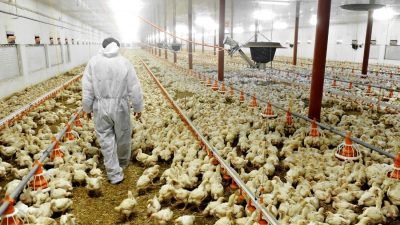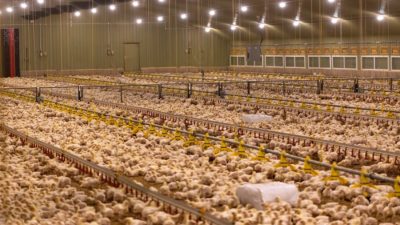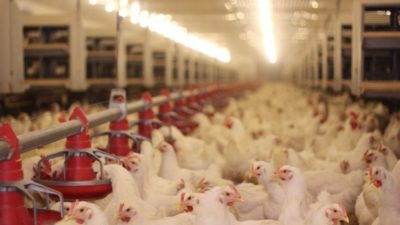‘Farmers subsidised to phase out Frankenchickens’…
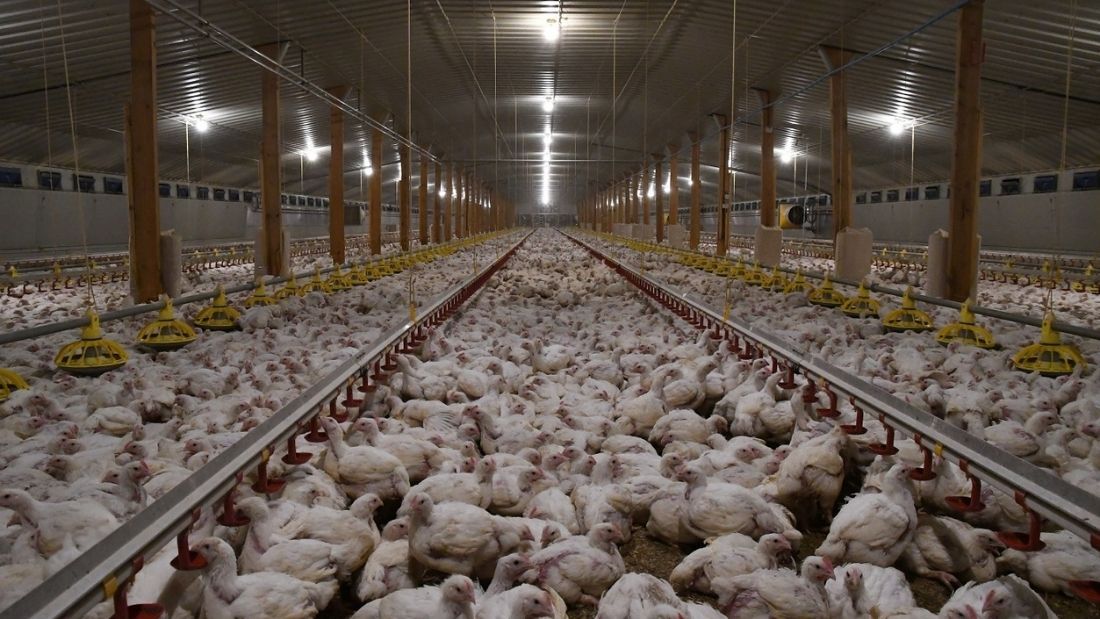
…made the headlines in The Telegraph recently, which means that the Government has committed to phase out the breeding of fast-growing chickens for meat, otherwise known as broilers. This win for animals is the result of combined efforts by animal protection groups including Open Cages, The Humane League and Animal Equality, campaigning for the ‘Better Chicken Commitment’.
‘Fast-growing’ means that broiler chickens reach slaughter weight more quickly than they would naturally – at just six weeks old – which increases profits for the industry. Fast-growing breeds, such as Ross and Cobb, are the most commonly found breeds on UK farms. This genetic selection has come at a detrimental cost for the birds. Growing more quickly than their body can handle and putting on more weight than their bones can carry, fast-growing breeds of chickens frequently suffer from severe lameness and heart attacks when they are just a few weeks old.
We congratulate the animal protection groups for helping to reduce the suffering inflicted on billions of animals by phasing out these fast-growing breeds. However, it is essential that the Government addresses the enormous risk factory farming poses to public health as well as serious animal welfare concerns – which will not be solved by switching to slower-growing broiler breeds who are allowed to live just ten days longer in factory farm conditions.
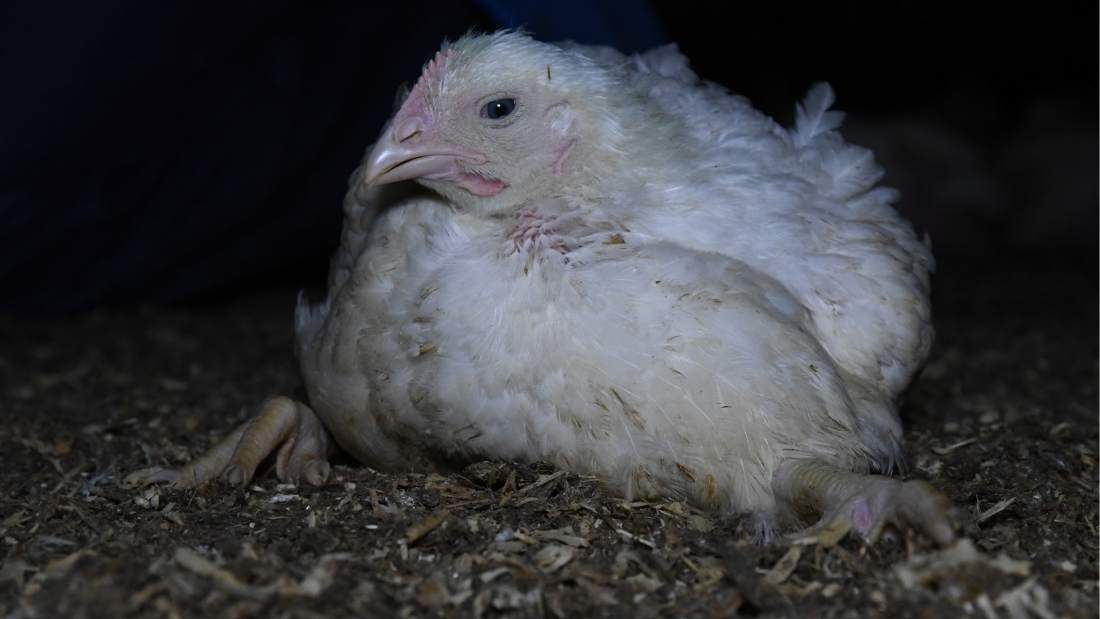
Broiler chicken in an intensive broiler farm
This Is Still Intensive Farming!
The Better Chicken Commitment does not mean the end to factory farming. Even if every British company adopted the Better Chicken Commitment, the reality is that hundreds of millions of chickens would still be crammed into industrial sheds – tens of thousands in each one. The Better Chicken Commitment is the same as the RSPCA Assured standards in terms of how many chickens can be crammed in, at 15 birds per square metre, based on a 2kg adult weight. This amounts to little more than a sheet of A4 paper per bird. In terms of ‘enrichment’, the Better Chicken Commitment calls for a minimum of just two metres of usable perch space and two pecking substrates per 1,000 birds. In short, these inquisitive animals are still denied all that is natural.
Whether chickens are under the Better Chicken Commitment or not, they are still deprived of their mothers. Instead of being nurtured by a caring parent who helps the chicks break out of their eggs, when chicks are born into farms they are quickly vaccinated through misting or a needle in their neck, and then left with thousands of other chirping chicks calling for their mothers in industrial sheds, subjected to almost constant lighting to stimulate growth for their first week of life. In factory farming, these chickens are exposed to hock burns, can endure pecking and cannibalism from their inmates due to stress and are vulnerable to diseases as a result of the unnatural, unhygienic conditions, such as Campylobacter, H5N1 and H5N8.
As slower-growing breeds, Better Chicken Commitment chickens are less likely to suffer the problems associated with fast-growing breeds, but they will suffer nonetheless. Instead of being killed at six weeks of age, they will be killed at approximately seven weeks of age.
Pandemics
Factory farms are the ideal breeding ground for diseases and give viruses the perfect opportunity to spread, mutate and jump to humans. Earlier this year, the H5N8 strain of avian influenza (bird flu) was found at turkey fattening units in North Yorkshire and Norfolk, which resulted in the culling of more than 35,000 birds. Tens of thousands of broiler breeder chickens, game birds and egg-layers have also been culled.
H5N8 currently poses little threat to humans, although it has recently been reported that the virus has jumped to humans in Russia. The more serious H5N1 strain has also been discovered in the UK. Since 2003, over 800 people have been infected with the H5N1 avian influenza viruses and over 450 have died, with fatalities in Indonesia, Egypt, Vietnam, China, Cambodia, Thailand and Canada. These numbers might seem low compared with other pandemics. However, if the virus mutates to spread more easily between humans, we could be facing a deadly pandemic the likes of which we have never seen before with a mortality rate of 60 per cent.
Virologists say it is a matter of when, not if, H5N1 becomes more infectious. Switching to slower-growing breeds, confined within factory farms, will not protect us from new pandemics which could be far more deadly than Covid-19.
Antibiotic Resistance
Without widespread use of antibiotics, diseases would spread rapidly in factory farms given the filthy, unhygienic conditions crowded with unhealthy animals. Scientists are warning that we are on the edge of an antibiotic resistance apocalypse and that antibiotic resistance is driven in part by the overuse of antibiotics in farmed animals. If we enter a post-antibiotic world, it would result in several millions of preventable deaths every year. More people would die from antibiotic resistance than from cancer.
Climate breakdown
Factory farming is costing the earth. Meat, dairy and egg production are responsible for 60 per cent of agriculture’s greenhouse gas emissions, while animal products provide just 18 per cent of calories and 37 per cent of protein levels around the world. The most comprehensive analysis of the impact of farming proved conclusively that going vegan is the single biggest action individuals can take for the planet.
End Factory Farming Before It Ends Us
Viva!’s undercover investigations have exposed the shocking reality of what ‘high welfare’ really means in this country and repeatedly found that assurance schemes such as Red Tractor and RSPCA Assured allow for unimaginable suffering. From severe overcrowding in poultry and pig farms, farrowing crates for pigs, confined chickens and routine mutilations including tail docking to teeth clipping, factory farming inflicts untold suffering on approximately one billion land animals in the UK every year. Animal welfare, human health and environmental protection is dismissed in factory farming’s mantra of ‘profit above everything else’.
The Government Must Act Now
Slower-growing breeds will reduce suffering to some degree for farmed chickens. However, if subsidies are available to incentivise farmers to move to a different chicken breed, why can the Government not take this opportunity to support farmers in transitioning away from animal farming altogether in light of the serious risks that factory farming presents?
We ask the UK Government and Defra to listen to the science and impose a ban on UK factory farming immediately to protect animals, planet and people.
- Viva! is committed to empower consumers not to buy into the cruelty of animal farming, and instead choose a kinder lifestyle by choosing vegan. Try vegan now with Viva!’s 7 Day Vegan Challenge.
- Sign our Open Letter to Boris Johnson urging him to end factory farming.




